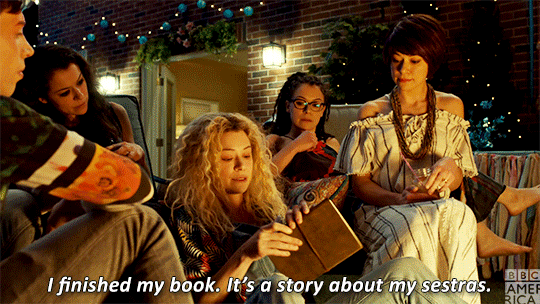Content warning for death, spoiler warning for Orphan Black 5.10
Gwen Stacy dies, and it is the end of her story. In many ways, it is the beginning of Peter’s; her death prompts change within him, growth. That is often how it goes; I have seen more women die on my screen than I could ever hope to count. And sometimes, those deaths make sense. Sometimes, they are the natural end to an arc.
Sometimes they matter.
Gwen Stacy dies, and Peter lives, and her death does not matter. Here’s why.
The Numbers
In June of 2016, Vox put out a list of every TV death in the 2015-2016 season. Characters were eligible if they had been present in three or more episodes and died a final, resolute death. In total, 242 characters died; of those, 106 were women. Twenty-two of those women were LGBT, and ten of those twenty-two were LGBT women of color. Admittedly, most characters on TV are men, and most women that do appear are straight and white. The fact that nearly half of LGBT women that died are women of color is truly shocking given how few are portrayed to begin with.
With these numbers, 44% of major character deaths on TV in the last couple of years were women. Of course, major characters aren’t the only ones that matter.
But I still caught sight of them as I compiled this list. As I scoured hundreds of show summaries, character breakdowns, and IMDB credits, I realized that the overwhelming majority of tossed-off deaths belonged to women. I saw the same clause over and over again: “When a woman is found killed…”
But under my own parameters, all those disposable women didn’t count.
…
This qualification is also at least in part responsible for the fact that recurring/regular female characters were killed off at a lower rate than men. There are simply fewer regular/recurring female characters — and many shows were already killing women left and right, within an episode or two of introducing them in the first place.
-Vox
The problem here is two-fold: women are not protagonists as frequently as men, and minor female characters are often seen as disposable. In fact, there are several well-known tropes about it.
When a woman is considered disposable, another question must be asked: why is she being disposed of? What plot is being furthered? Who grows when she dies? The answer, more often, revolves around a man. That is why these deaths are unacceptable; they do not further the woman’s arc, do not conclude her story.
Character death is no longer a surprise, especially with Grimdark narratives in the front seat; it is not a shock anymore, not when show-runners tease it during every convention, every press conference.
“Someone will die,” they say. It’s usually not hard to figure out who.
The Hacker
If, on the aforementioned Vox list, you click women and LGBT, one of the 22 is named Root. Introduced on Person of Interest on February 2, 2012, she died on May 31, 2016. That is a better run than many LGBT women get.
In the end, Root dies a quiet death; she does not go out with a bang, but with a bullet meant for Harold Finch. She dies without fanfare, without closure, and the Machine begins to use her voice soon after.
When Finch is sure he will have to sacrifice himself to stop Samaritan, she becomes his savior once again, helping determine a viable alternative that ends with deaths, but not Finch’s.

Time and time again, Root literally and figuratively saves Finch. And in the canon of the show, Finch is responsible for nearly every plot point during the show. Finch created the Machine and set everything into motion, and Finch walks away and into the arms of the woman he loves.
That is not to say that exoneration is not possible; it very much is. But that kind of growth and change must come from within. A narrative cannot absolve a man of his guilt and responsibility by placing it onto a woman.
Root bleeds out because of a bullet meant for Finch. In turn, he does not have to pay for his actions because other people pay for him; he frees himself from guilt by allowing other people to die.
The Princess
Morgana dies, that much was clear from the beginning. Any character based off of Morgan le Faye was more than likely going to turn evil and, as most series antagonists do, die at the end.
Only Merlin was no typical telling of the Arthurian legend. Morgana started the story a compassionate, benevolent ward of the king. In fact, her turn toward cruelty is largely the doing of Merlin himself. When Morgana begins to develop powers, Merlin refuses to talk to her about them or help her.
He allows her to become isolated and alone, and it all comes to a head when he poisons her without ever explaining why, without ever explaining that she is the source of a curse. He takes a woman defined by her goodwill and kindness and twists her spirit until the only person she can turn to is her half-sister Morgause. And then he has the audacity to be surprised when she turns out evil.

She dies, but not until Merlin has the chance to say he always blamed himself for what she had become. The sentiment means significantly less at the moment of her demise; he has had years to fix his mistakes, but he neither recognizes nor atones for them until Arthur and Morgana both lay at his feet.
Just as with Finch, Merlin walks away. Morgana does not. Morgana can’t.
The Men
Of course, men die too. In both Merlin and Person of Interest, in fact, leading men die: Arthur and Reese, respectively, do not survive past their series finales. But neither of their arcs revolve around the other man. They are connected, certainly, in very large ways. They build off of each other, but they do not depend on each other.
When Arthur dies, he does not have a man looking down at him, saying how he blames himself for the past several years of pain. When Reese dies, he does not become part of the Machine Finch created in order to help save his life once again.
They die, but they are allowed to die on their own terms, going out strong and fighting. Unlike the disposable women, they are allowed to matter.
The Future
Death, however, is not the only end for a disposable woman. In fact, it is increasingly not the end; as viewers demand better representation, showrunners have begun to switch their tactics. Now, instead of dying, women live to help men grow.
Kara Danvers was once a strong, incredible woman and superhero; by the end of Supergirl season 2, she had been reduced to a love interest.
Writers and cast members have stated that Kara and Mon-El’s relationship was challenging, exciting. But it is not—and should never be—a woman’s job to help a man grow, whether she survives the process or not. It is not Kara’s job to make Mon-El a decent person, no matter what the writers may believe.

Painting this as Kara’s choice, as a side effect of her caring spirit, forgets that Kara is a woman, that the Supergirl writing team is primarily male, and that she cannot make any choice of her own. Every decision made for her—from dating Mon-El after repeatedly rejecting him to giving up who she is after he leaves Earth—is a decision written for her based on societal norms and patterns that contribute to the systematic disempowerment of women every day.
It is easy to feel hopeless sometimes. I know I do. When I turn on the TV and see story after story about women giving up their lives, morals, and humanity to appease and assist men, it is easy to feel unrepresented, misunderstood, and hurt.
Even more importantly, many of these shows are marketed toward young women. When they watch their favorite superhero give up who she is because of her boyfriend, what message does that send them? When a young woman sees her favorite character—the one she relates to, the ones she loves—die while the leading men walk away, what does that make her feel? What happens when she sees that a second time, a third?
How many times can someone watch their representation die before it starts to feel personal?
“Anyone can die” won’t be a truthful sentence until “any kind of character can be at the very heart of the story” and “anyone can run a TV show” are factual statements as well.
Given that unhealthy romance narratives in the media we consume do indeed affect public perception and actions against real life abuse and wrongdoing, media creators must do better.
And many are: take Orphan Black. The series finale, which aired this past Saturday, closed the clones’ story on an unexpectedly happy note. None of the primary clones died; in fact, they all came together at the end to help save people.
Orphan Black began as a story about a woman’s autonomy and identity. It ended by proving the entire plot worthwhile.

Take Wynonna Earp. The show is currently in the middle of its second season, and the protagonist is a pregnant, demon-fighting woman who has never once had to take second place to a man. Take Wonder Woman, and The Bold Type, and so many other movies, TV shows, and video games that are telling the stories of brave, bold women who are in charge of their own destinies. It is happening.
But I can still turn on whatever crime show is on tonight and, more likely than not, see a women dead before my eyes. I can still walk into a movie theater at random and know the protagonist will likely not be female. And when I am proven wrong, I know that she will be white and straight.
That is why Gwen Stacy’s death did not matter, because she is still dying. Because “let’s kill the woman” is still a valid idea in writer’s rooms across the globe, and because it has grown from a reasonable story telling choice to a pattern, and that pattern cannot and should not be overlooked. Because it is overdone and yet it is still done, over and over and over again.
We can do better than that.

